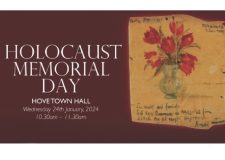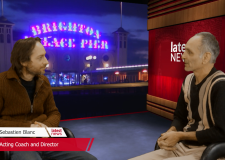Vanessa Austin Locke: The Public House Bookshop
There’s a wonderful moment that occurs for some lucky women when they begin to listen to their mothers. What they hear are the stories that reveal why they are the women they’ve become.

One such story my mother, Dawn, recently recounted in sleepy Sunday tones saw me lying wide-eyed in my pram as neo-Nazis terrorised our favourite haunt, The Public House Bookshop.
She went to see her friend and former owner of The PHB, Richard Cupidi, talk about it as part of The Brighton Festival this year, and it became clear that, entirely unaware and in thick of things, we’d witnessed something incredible.
She recounted how The PHB only advertised for staff once, and the ad went like this: “Worker Wanted – Exceptional human being possessing the following traits and perversities: reasonable level of literacy… manageable neuroses… sense of the absurd.”
“Anita Roddick went there to scribble down recipes for herbal cosmetics”
And then she continued thus… “The PHB attracted intellectuals, anarchists and 1970s and ’80s radicals, publishers of political, gay, feminist and esoteric ‘right on’ magazines. What I didn’t know was that Anita Roddick went there to scribble down recipes for herbal cosmetics, nor that while the fortnightly crèche was being held for information-hungry mothers, neo-Nazis were regularly targeting and trashing the shop with marbles through the windows and napalm in the rubbish bin. As a young mother leaving kids asleep in their buggy at the front of the shop, I might (but only might) have taken comfort knowing that the shop was protected by a group of anarchist bus drivers with Buddhist leanings.”
She reminded me how Ezra Pound’s quote hung above the customers, “The book should be a ball of light in your hands.” Now it hangs above my writing desk.
“It was the first place in town to stock Gay News alongside Talking Stick, a native arts quarterly, Quim and Spare Rib. The only items Cupidi recalled rejecting were Paedophile Information Exchange and Mein Kampf, although a Column 88 hit squad member came in for a copy every year, in defiance of the obvious.”
From what I can tell, the community spirit that supported The PHB from its opening in ’73 seemed to relax into the affluence and relative social peace of the ’90s, as the Net Book Agreement dissolved and chain bookshops ate the competition, and in ’99 it closed its doors. But the shop had done exceptional work, which was not reflected (as is the case with most important things) in its financial status, but rather in the social peace that it had been part of creating via education and which arguably led to its closure. A business that serves its community is an alien idea to most of us these days. “Cupidi would mostly ask shoplifters to justify why they wanted the purloined item before reaching a mutually acceptable resolution with them, such as reading it downstairs.”
My mother recalls the day of the shop’s final closure. “It was celebrated like any other PHB pow-wow, with a beer, salsa and brownies bash. Its workers moved on to work for the Arts Council and become university lecturers, and Cupidi developed his exceptional talents both as a storyteller and adult educator. It had been a tough ride on wages of £17 pounds a day – one worker proclaimed it as the worst paid job he had ever had, adding ‘But I’d have paid you!’.”




















